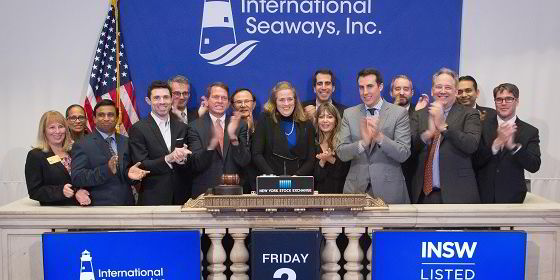International Seaways reported a fourth-quarter and full-year loss in it first earnings report as a separate company from its former parent Overseas Shipholding Group.
But chief executive Lois Zabrocky said the company can withstand the current tanker cycle due to its low operating costs and room on the balance sheet for potential acquisitions.
International Seaways is "starting with a tanker fleet of scale, a strong balance sheet and dedicated employees," Zaborcky said in her first conference call with analysts. "I am confident in the solid foundation we've built that can be a platform for success."
The New York-listed company reported a fourth-quarter loss of $57.8m compared to a $37.6m profit in the year earlier quarter. Revenue for the quarter dropped 31% from a year earlier to $85m.
Chief financial officer Jeff Pribor said fourth-quarter results were impacted by a $60m impairment charge and separation costs from its parent. Excluding the one-time charges, International Seaways would have reported net income of $0.28 per share.
That result was below a $0.32 per share estimate from Seaport Global Securities.
For the full-year, International Seaways reported an $18.2m loss on revenue of $360m. Without one-time charges, International Seaways would have reported $3.46 per share for all of 2016.
Zabrocky says time charter rates may be weaker in 2017 as Opec cuts impact tanker demand. But those cuts are being offset by increasing cargo activity from the US and Brazil.
Asia's crude buyers is "are pulling a lot of volume from the Atlantic to the Pacific, offsetting the tonne-mile impact from Opec cuts," Zabrocky said.
Nonetheless, Zabrocky says International Seaways can withstand the current cycle thanks to a high level of charter coverage, providing roughly $100m in annual revenue, and low breakeven costs of around $14,000 per day.
The time-charter revenue is "more than covering our fixed costs," Zabrocky said.
She says the clean tanker market, where International Seaways has 20 medium-range (MR) tankers, is seeing healthier demand thanks to refinery maintenance, falling inventories and increasing vessel delays at West African ports.
As for vessel acquisitions, Zabrocky says the company's undrawn credit facilities and cash flows can be put to potential acquisitions in the second-hand market. She said deals could be done in either dirty or clean tanker segments.
"Both of the two sectors are ones we would like to be in," Zabrocky said.



